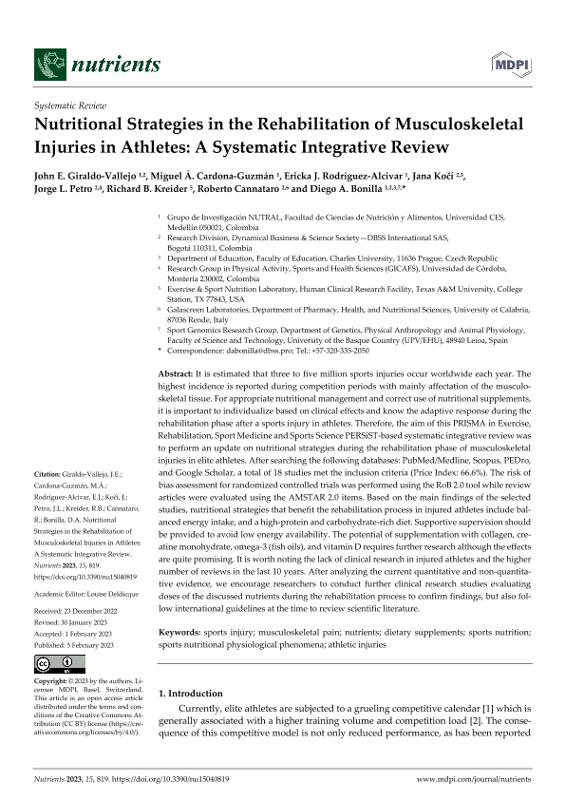Mostrar el registro sencillo del ítem
Nutritional Strategies in the Rehabilitation of Musculoskeletal Injuries in Athletes: A Systematic Integrative Review
| dc.contributor | Kočí, Jana | |
| dc.contributor | Petro Soto, Jorge Luis | |
| dc.contributor | Kreider, Richard | |
| dc.contributor | Cannataro, Roberto | |
| dc.contributor | Bonilla, Diego Alexander | |
| dc.contributor.author | Giraldo Vallejo, John Edison | |
| dc.contributor.author | Cardona Guzmán, Miguel Ángel | |
| dc.contributor.author | Rodriguez Alcivar, Ericka | |
| dc.contributor.editor | Bonilla, Diego Alexander | |
| dc.date.accessioned | 2023-02-07T15:50:04Z | |
| dc.date.available | 2023-02-07T15:50:04Z | |
| dc.date.issued | 2023-02-05 | |
| dc.identifier.issn | 2072-6643 | |
| dc.identifier.uri | https://hdl.handle.net/10946/7299 | |
| dc.description | Metodología: Revisión sistemática integradora | spa |
| dc.description.abstract | It is estimated that three to five million sports injuries occur worldwide each year. The highest incidence is reported during competition periods with mainly affectation of the musculoskeletal tissue. For appropriate nutritional management and correct use of nutritional supplements, it is important to individualize based on clinical effects and know the adaptive response during the rehabilitation phase after a sports injury in athletes. Therefore, the aim of this PRISMA in Exercise, Rehabilitation, Sport Medicine and Sports Science PERSiST-based systematic integrative review was to perform an update on nutritional strategies during the rehabilitation phase of musculoskeletal injuries in elite athletes. After searching the following databases: PubMed/Medline, Scopus, PEDro, and Google Scholar, a total of 18 studies met the inclusion criteria (Price Index: 66.6%). The risk of bias assessment for randomized controlled trials was performed using the RoB 2.0 tool while review articles were evaluated using the AMSTAR 2.0 items. Based on the main findings of the selected studies, nutritional strategies that benefit the rehabilitation process in injured athletes include balanced energy intake, and a high-protein and carbohydrate-rich diet. Supportive supervision should be provided to avoid low energy availability. The potential of supplementation with collagen, creatine monohydrate, omega-3 (fish oils), and vitamin D requires further research although the effects are quite promising. It is worth noting the lack of clinical research in injured athletes and the higher number of reviews in the last 10 years. | spa |
| dc.description.sponsorship | División de investigación DBSS International, Universidad CES, GICAFS, Excercise and Sport Nutrition and Laboratory Texas University | spa |
| dc.language.iso | en | spa |
| dc.publisher | Universidad CES | spa |
| dc.relation.uri | https://www.mdpi.com/2072-6643/15/4/819# | spa |
| dc.rights.uri | http://creativecommons.org/licenses/by-nc-nd/4.0/ | * |
| dc.subject | Sports injury | spa |
| dc.subject | Musculoskeletal pain | spa |
| dc.subject | Nutrients | spa |
| dc.subject | Dietary supplements | spa |
| dc.subject | Sports nutrition | spa |
| dc.subject | Sports nutritional physiological phenomena | spa |
| dc.subject | Athletic injuries | spa |
| dc.title | Nutritional Strategies in the Rehabilitation of Musculoskeletal Injuries in Athletes: A Systematic Integrative Review | spa |
| dc.type | Articulo de revista | spa |
| dc.audience | Estudiantes de nutrición y dietética y profesionales de postgrado en nutrición deportiva | spa |
| dc.educationLevel | Pregrado y postgrado | spa |
| dc.contributor.role | Coinvestigador | spa |
| dc.rights.cc | Attribution-NonCommercial-NoDerivatives 4.0 Internacional | * |
| dc.rights.accessrights | info:eu-repo/semantics/openAccess | spa |
| datacite.rights | http://purl.org/coar/access_right/c_abf2 | spa |



